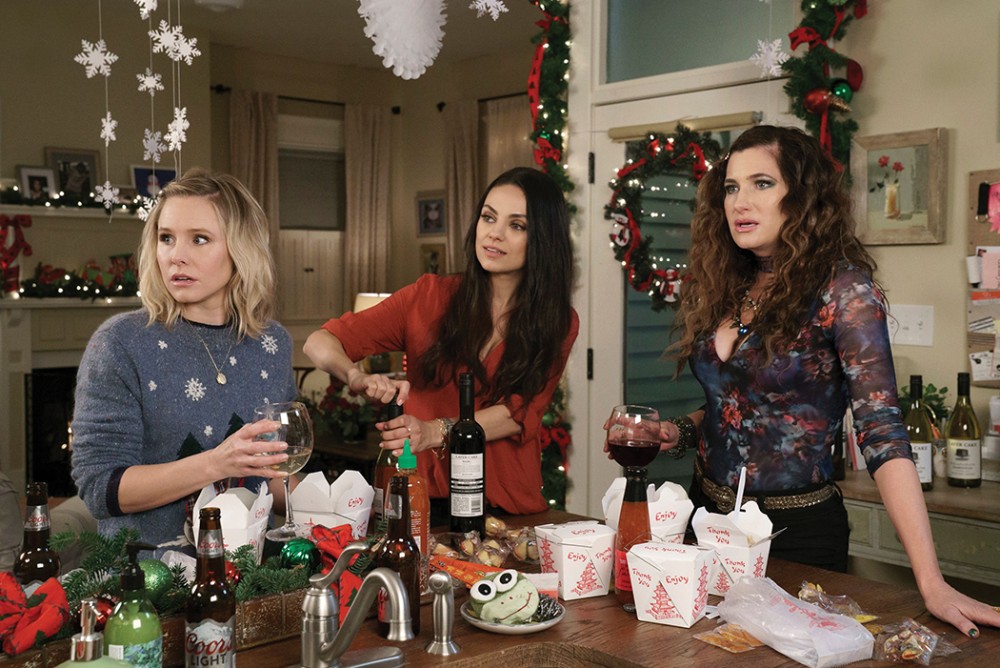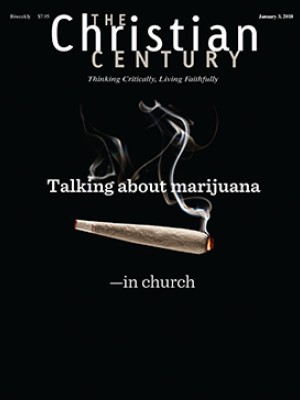A Bad Moms Christmas and Daddy's Home 2 are bad movies
Films about struggling moms and toxic masculinity should challenge traditional gender roles, not applaud them.

Recent Hollywood films about families at the holidays will convince you that home is the last place you want to be at Christmas. A Bad Moms Christmas and Daddy’s Home 2 suggest that family is a stew of noxious gender tropes, preening perfectionism, and soul-crushing competition.
As a working mom juggling the daily grind, I was probably the intended audience for A Bad Moms Christmas, but I couldn’t recognize myself or anyone I know in it. The franchise (there was Bad Moms in 2016) is written and directed by two men, Jon Lucas and Scott Moore, who imagine women trapped in overwhelming social expectations of perfection. Since no one can meet the goal of having and doing it all, all moms are really “bad moms.”
Read our latest issue or browse back issues.
The first Bad Moms movie coats this genuine cultural dilemma in platitudes about eternal maternal love and speeches about less homework and more fun. By the end of A Bad Moms Christmas, however, it is pretty clear that a bad mom is one who gets wasted and engages in random acts of vandalism. In the first movie, the bad moms trash a grocery store; in the new one they trash a Santa display at the mall. These are cartoonish women, barely rising to the status of meaningful human beings. The films don’t challenge the structures that trap moms in outdated gender ideals—unsupported by maternity leaves—and in a culture of sexual objectification and harassment.
Things aren’t much better for the dads over at Daddy’s Home. The first version of this movie (2015) was clunky and uneven, but charming in a pre-2016 way. It follows stepdad Brad Whitaker (Will Ferrell) as he tries to negotiate the return of biological dad Dusty Mayron (Mark Wahlberg). Brad is an earnest husband and father, who delights in domestic tasks and the mundane routines of parenthood. Dusty is a world-traveling black ops agent who exudes alpha masculine cool. In the innocent days of 2015, the movie offers gentle jabs at Brad’s effeminate habits but lands squarely on his side. It is Dusty who needs to grow up and let go of his toxic masculinity. He needs to accept male friendship instead of competition.
Not so in the sequel. In Daddy’s Home 2, when Dusty’s and Brad’s dads show up for Christmas, it is a free-for-all of masculine competition and dangerous, vile pranks. Children get drunk. They are given loaded firearms (thankfully not at the same time). Women compete to be the most scantily clad. And no one learns anything about responsibility, cooperation, kindness, or even the basic tenets of respect.
The fact that both of these franchises are in their second installments (and both have third movies scheduled, to be set in Las Vegas) suggests that there is an audience hungry for these narratives. In my most sympathetic spirit, I understand the bacchanalian desire that drives these films. But the films are cruel and cynical. They mock the very conventions they depend on, without suggesting any hope for change.
My Christmas gift to you this year are some pop culture alternatives. On the surface, the characters in these works also are dysfunctional and confused. However, they are anything but cynical in their desire to find human meaning and connection.
If you want to see moms struggling against the prison of perfectionism but prefer your female characters as fully drawn human beings, try Better Things. In this FX show currently in its second season, Pamela Adlon writes, directs, and stars as Sam Fox, a single working mom of three girls. Sam is an actress with just enough success to keep going but not enough to rest easy. The show is most daring when it suggests that as hard as this juggling act might be, Sam gets pleasure out of both her work and her parenting. The show is stronger with every episode, because Sam is allowed to be confident and wise, exhausted and confused, content and restless all at once.
If you want to explore toxic masculine pride in family life without being asked to applaud it with your laughter, try The Meyerowitz Stories (New and Collected), directed by Noah Baumbach (streaming on Netflix). Dustin Hoffman plays patriarch Harold Meyerowitz, an aging visual artist who achieved mild fame decades ago but now dominates everyone with his sense of failed ambition and unfulfilled glory. The movie is really about his three children, who have been variously wounded by their father’s solipsism. Nothing is excused in the painful excavation of their wounds. But there are moments of grace and healing as the siblings move out from under the shadow of their father’s domination into a deeper understanding of each other.
And if you want the family at its very worst and very best, try Transparent, the Amazon series in its fourth season. Gender in all its many performances—from ironclad rules to slippery ambiguity—runs through this family drama. Members of the Pfefferman clan are confused and often selfish. But this show operates in a moral universe. It allows us to judge the characters without dismissing them, to cheer for them without excusing them, and to marvel at their small steps toward the transparency the show offers as its cardinal virtue.
A version of this article appears in the January 3 print edition under the title “Bad movies Christmas.”







